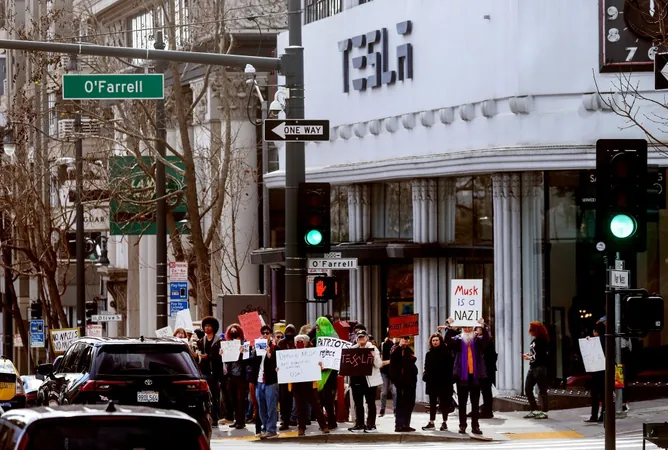
Bay Area Tesla Owners Ditch Their Cars Amid Musk's Controversies—Is It the End of an Era?
2025-03-17
Author: Wei
In a remarkable turn of events, a growing discontent among Tesla owners in the Bay Area has led many to sell their once-beloved electric vehicles. The driving force behind this trend? A strong backlash against Tesla’s CEO, Elon Musk.
Take the case of Janis Brown, who purchased her dark green Model S in 2012. For her and her husband, this was more than just a vehicle—it symbolized their status as eco-conscious tech enthusiasts. However, as Musk became embroiled in a series of controversies, including mass layoffs at Twitter and his vocal support for Donald Trump, the pride associated with owning a Tesla morphed into embarrassment. “I was really embarrassed to be seen driving this,” Brown admitted, ultimately choosing to sell her car through Carvana.
This sentiment resonates with many in the region. Recent reports indicate that Tesla sales in California fell by 11.6% in 2024, marking a drop from 230,010 units in 2023 to 203,221 units. Registering only 43,411 vehicles nationwide in January, Tesla witnessed an overall 1% decline in sales, a disturbing milestone for the once-thriving brand.
Richmond residents Brian Ambrosch and Shelley Facente also sold their Model 3, echoing Brown's feelings. Their disappointment with Musk’s comments on social issues and workplace misconduct at Tesla factories led them to seek alternatives among electric vehicle competitors. “I cried the day we cleaned out our stuff,” shared Facente, yet her resolve never wavered after making the difficult decision.
Monika Gorkani from Los Gatos, too, expressed similar views, disillusioned by Musk’s shifting stances. Once an ardent supporter, she found it increasingly challenging to reconcile her values with her continued support of his ventures. “I was planning to drive it until the battery wasn’t working, but I couldn’t sleep knowing I was somehow supporting him,” she stated.
The backlash against Musk is reflected not only in declining sales but also in public protests against Tesla dealerships, underscoring a sense of urgency to distance themselves from the CEO's controversial reputation. While Musk's dictum has led to significant stock volatility—his companies' stock plummeting by 52% since last December—there appears to be no slowing down for Musk’s other businesses, such as SpaceX and Neuralink, which have seen their values soar by 45% on private markets.
Despite the backlash, dedicated Tesla enthusiasts continue to rally support for the brand. Organizations like Tesla Owners East Bay and Tesla Owners Silicon Valley continue to host car events, fostering community among Tesla fans. Such events illustrate that while Musk's behavior has turned some owners away, many still cherish the connection to the brand and its pioneering electric technology. “Tesla is employing tens of thousands of people in California,” said John Stringer, president of Tesla Owners of Silicon Valley. He expressed concern over the increasing violence and vandalism directed toward Tesla owners, highlighting the need for unity and resilience within the community.
As Tesla confronts this backlash and navigates a changing landscape, the question remains: will it withstand the storm, or is this the beginning of a long-term decline? The Bay Area's evolving sentiment toward Musk and Tesla signifies a potential shift in how consumer loyalty aligns with corporate leadership—a crucial narrative to watch as the electric vehicle market continues to mature.


 Brasil (PT)
Brasil (PT)
 Canada (EN)
Canada (EN)
 Chile (ES)
Chile (ES)
 Česko (CS)
Česko (CS)
 대한민국 (KO)
대한민국 (KO)
 España (ES)
España (ES)
 France (FR)
France (FR)
 Hong Kong (EN)
Hong Kong (EN)
 Italia (IT)
Italia (IT)
 日本 (JA)
日本 (JA)
 Magyarország (HU)
Magyarország (HU)
 Norge (NO)
Norge (NO)
 Polska (PL)
Polska (PL)
 Schweiz (DE)
Schweiz (DE)
 Singapore (EN)
Singapore (EN)
 Sverige (SV)
Sverige (SV)
 Suomi (FI)
Suomi (FI)
 Türkiye (TR)
Türkiye (TR)
 الإمارات العربية المتحدة (AR)
الإمارات العربية المتحدة (AR)